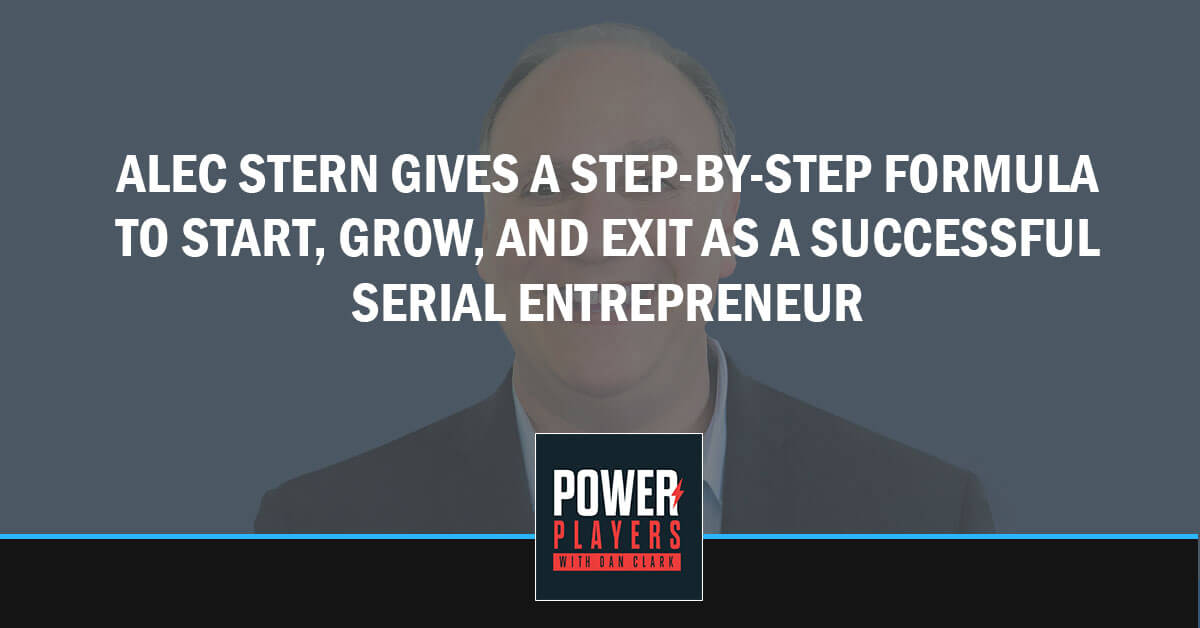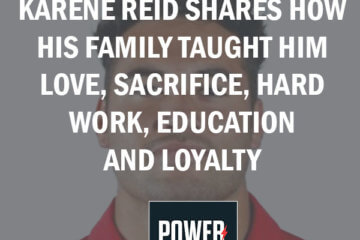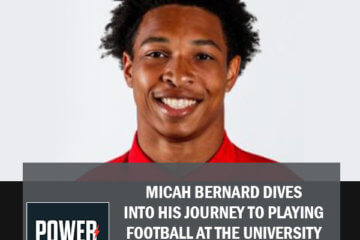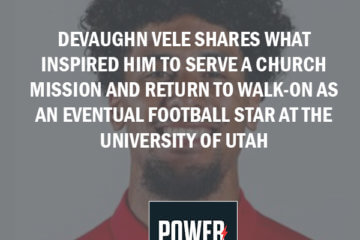Listen to the podcast here

Being an entrepreneur is tough as it is. That is why finding serial entrepreneurs who are successful at their games make for a great source of learning and advice. Dan Clark has the right person who has done remarkably well being one. In this episode, he sits down with none other than Alec Stern. He is the co-founder of eight startups with five exits and one of the founders of Constant Contact. Here, Alec shares his life story and why he’s been selected for top honors and awards—having been recognized as the world authority for entrepreneurship. Not only that, he is also a world-class drummer. Alec gives us the step-by-step formula required to start, grow, and exit as a successful entrepreneur. Packed with music metaphors and a whole lot of heart, this conversation is definitely not one to be missed! Tune in!
—
Alec Stern Gives A Step-By-Step Formula To Start, Grow, And Exit As A Successful Serial Entrepreneur
This is an interview with America’s Startup Success Expert, Alec Stern. Welcome to the show. Thank you so much for spending some time with me. In this episode, my friend and colleague Alec Stern, who has been a Cofounder of 8 startups with 5 multi gazillion-dollar exits, 2 IPOs and 3 acquisitions and 1 of the 3 who founded Constant Contact, which he and his partners sold for $1.1 billion, shares his life story and why he has been selected to the Influence 100 Authority List by Influence Magazine. He is also recognized as The World Authority for Entrepreneurship by The Credible Source. As a world-class drummer and serial entrepreneur, he gives us the exact step-by-step formula required for an entrepreneur to start and grow an exit in an extremely successful business.
—
This will be one of the most unique interviews that I’ve ever conducted because it’s with Alec Stern, who is an entrepreneur, speaker, mentor and investor but also a dear friend. We’ve had the privilege of sharing the platform many times. I’ve been a professional speaker for many years and I’m rarely intimidated by someone who I know is preceding me on the program on the stage or is coming after me.
I take this word very seriously, Alec Stern has become known as America’s Startup Success Expert for performing hundreds of keynote speeches worldwide and for his popular sessions at top conferences, which we’ve had the chance to share the platform on, Secret Knock, CEO Space International, Poweteam International and Habitude Warrior.
I don’t want to take our precious time by diving too much into his incredibly long bio and experience. I want to cut right to the chase and guaranteed that his bio and credibility will come out as he answers my evocative questions so we get a chance to dive into the heart and mind of a true serial entrepreneur. Of all the things that he’s been able to do, he’s the Cofounder or founding team member of 8 startups with 5 exits, 2 IPOs and 3 acquisitions. As a primary member of the Constant Contact founding team, he was 1 of the original 3 who started the company in an attic.
Alec was with the company for many years from startup to IPO to a $1.1 billion acquisition. When I said performing, Alec is a world-class drummer. When you sit next to him, at a table in a ballroom where he’s waiting for his turn to take the stage or he is kicking back in a break, you ought to hear his magical fingers go to work with two dinner knives on a tablecloth round table. He is awesome.
You have missed your calling. You should have been in Journey, Boston, Aerosmith or so many of those Boston-based bands from the days. Welcome to the show, Alec. I love you and honor you. Teach us first right out of the chutes what Constant Contact is and how it differentiates from a classic stereotypical customer relationship management program because you are one, if not, the very first, in your digital space. Teach us a little bit about Constant Contact before I get into your personal life.
I love you. I appreciate that warm intro. Constant Contact was the first digital marketing tool for small businesses. The first one that we started with was email marketing and the suite grew into many other tools. It wasn’t necessarily a CRM per se but a lot of small businesses weren’t thinking of CRM or acquiring a CRM tool so they kept their contacts within Constant Contact. Many added manually elsewhere on a spreadsheet or maybe an accounting tool but they would bring it into Constant Contact. It’s initially email marketing to handle all of their individual personalized messages sent out to a group.
What year was that? I believe I was one of your very first customers. I’m looking for that discount coupon in the mail at some point.
Drumming does take discipline because you’re the rhythm, beat, and heartbeat.
This is back in the day when football players wore leather helmets. I assume you were there because you played the sport.
I wore a helmet and showed them a pad so I needed Constant Contact.
This was at the end of 1997 and the beginning of 1998. A couple of years later, we all know of SaaS software As A Service. SaaS didn’t exist. We were 1 of the first 2 that were SaaS applications ever. We are trailblazing with a lot of firsts. There were enterprise tools. Back in the day, when you think of some of the folks we know like Amazon and others that were getting going with their marketing, there were enterprise tools, agencies and resources but when we went on to the main street, the average small business had nothing.
What we set out to do is to level the playing field first for small businesses against those big competitors. Could we give them a tool that all they had to worry about was what, when and to whom they wanted to say it? We do the rest of it and it covers, “All you have to do is put in your colors or images, logo, content, hit send and then we’ll provide you all the tracking and reporting.” There was a lot of power in what we were doing for that small business that didn’t have anything at the time.
You’re a world-class drummer. In the music business, we talked to dancers about being in the pocket and the groove. I want to challenge your creativity here and see if you can figure out a way to tie in the succinct, perfectly syncopated drum beat that drives every song. Every single musician relies on the drummer to keep them going and on the beat so they don’t lag or speed up. How does that mindset equate to being an entrepreneur?
You and I laugh until we go to sleep at night in the lobby, just entertaining. You’ve got one of the greatest personalities and senses of humor of anybody I’ve ever met. On the flip side, you’ve got that left-brain genius going. I want you to teach our readers how significant it is for you to be able to amalgamate both sides of the brains that discipline syncopated, on the beat, on the line, never wavering left or right from a drummer’s mindset?
How does that help you become an entrepreneur to stay focused on your goal, vision and business plan? Most entrepreneurs waiver everywhere. They take pride in being creative. They think they’re laid back and don’t have the discipline oftentimes to stick to the task. You have this amazing, unique ability that you’ve brought to the marketplace. That’s why you’re such a popular keynote speaker. You bring different twists and set of lenses through which entrepreneurs can look. I’m going to stop babbling and hopefully, I’ve planted enough seeds for you to take the left brain and tie it into the right brain, the creative and cognitive discipline required for you to be a serial entrepreneur.

Serial Entrepreneur: Find the people that are not in your lane and round it out with others.
I started drumming when I was eight. It’s been with me for a long time. I began beating on the metal garbage can lids and dented those. My dad hated that. I moved to pots and pans in the kitchen with knives or drumsticks and he hated that more. My mom and I would go to flea markets all the time. She saw Ludwig’s antique drum set and Ludwig’s wood and steel with club bald legs. I heard them. They walked away and I saw this drum set. It was beautiful, antique and I was like, “This is the coolest thing. Imagine playing that versus playing pots and pans.”
They went off to talk. There was an argument stewing about. My father said something to the effect of, “Over my dead body.” My birthday came and guess who got the drum set? You know who won that argument. One thing I did hear from my mom was, “Don’t squelch his creativity.” That still stuck. One of the things is drumming does take discipline because you’re the rhythm, beat and heartbeat. If a heartbeat skips a beat or rushes ahead, our problems can ensue. To your point, you’ve got to stay constant and flow.
There are a lot of things that equate regard to startup. One thing is discipline, starting something and then pushing forward with a pace to it. You can’t rush some things or skip beats when you’re doing that because there are many steps along the way. For example, when you first have your idea, everyone says, “We got to crank through, finish it and then show it to people.” I have never done that. I have always brought out something in a PowerPoint. Draw it on a napkin or do a prototype. It’s how it would flow or what it would look like and then go out as early often to that target market and get that feedback.
It gets you into the flywheel and rhythm of starting that business and getting it going. There’s a constant there. You can’t rush that. You have got to get that feedback and build the product. You could rush to get something done. I’ve seen this more often than not where some finish something and they bring it to the target market and like, “That’s not what we want. We’ll go to the drawing board and redo it.” You think about how you could weave in these things.
The other thing is to keep it cooler heads prevailing and the calm amongst yourself. That should be part of your culture because if everyone explodes or reacts too fast, we’ve got to move at a velocity. Let’s say that you might be picking up a song where there’s a faster or slower beat but it’s constant. You can’t disrupt that flow and let these things disrupt you.
I’ll give you one other example. Obstacles will freeze you. You’ll just stop playing. If you’re in the middle of a song and on stage, everyone is going to look back like, “Where’s the drummer? Where did he or she go? We’re stuck. What do we do?” When you have that obstacle, you got to plow through it. You can’t get stuck and I had to learn this. I used to go into the office and write the obstacle on a piece of paper, put a little box next to it and hope I checked it by the end of the day. It never happened.
Come in the next day, it is sitting right at the top or some days I see it on the 3rd or 4th day. I’m like, “Way I knew.” This is usually what takes on to a point where they grab their bat, ball and go home. You have to figure out, “How do I solve it?” You’re not the first one to experience that obstacle. There are many that experienced it before you. Somewhat failed at trying to solve it. Some had broken in of smaller pieces, got some small wins, chipped away and solved it. Others were able to solve it right out of the gate.
There’s an opportunity cost to not doing what you’re good at in your lane.
You’ve got to create the muscle memory to do that like you create muscle memory to be able to drum and keep the beat. I could hear everything. When I’m playing live in a song, I could hear something that there was a mistake but the average ear can’t. You plow through this thing, find a way to solve it and rally everyone else around you to also help where needed because you create that muscle memory and solve that. Behind is a bigger one. As the song is progressing sometimes you get excited. You’re playing faster and faster.
I can hear if someone is getting into the groove and then all of a sudden, there’s offbeat. There are the fun things that come in with music backbeats and things that in different areas of a song where you’re doing something completed, trained one way and then all of a sudden, you’re like, “We’re doing something opposite of what we used to do,” a backbeat or something. A business has all of those things. I often think that music fits into my mindset because all of the things that we do can tie back to the rhythm, beat or heartbeat of the business.
I love the music metaphor. To tie it into entrepreneurship, you don’t need two drummers in a band. You need to find people who are as equally talented, passionate and focused as you are. When you’re starting up a business, how do you go about finding the right players who need to play the instruments to make the kind of music that you want to play?
I’ve heard my daughter’s husband or my son-in-law started this amazing business. It’s successful with two of his high school buddies. Another one of my dear friends who exited $1.3 billion went to 5 of his high schoolmates, 2 of them out of the 5 said yes and the other 3 are kicking themselves. How do you go about finding and attracting the right players to play in your band when you have the entrepreneurial idea?
I do want to digress because there’s the old joke of the band going into their radio show and being interviewed. The host of the show asks, “How many members are in the band?” “We have 4 members and 1 drummer.” We don’t usually get the respect but at the end of the day, there wouldn’t be any good music without us. We should be upfront. The singer should be sitting in a chair.
You’re tapping into something very important to talk about and that is staying in your lane. If you’re great on the front end business development, front-facing, working with account managing or potential clients, you could easily get to more of others like you and I’ll do the same thing but when you’re not rounding out the bad and the analogy, you’re not going to be successful. I’ve heard some bands that say, “You can’t have just a drummer.” A great drummer could make a lot of music and fill in some of what’s missing, an amazing drummer like Neil Peart from Rush, John Bonham from Led Zeppelin and some of the top drummers ever in time.
The bottom line is you need some other player. You can get away with 2 or 3. You might say, “I’m good at that front end. I’m going to round this out with two other people that are filling areas that are not in my lane.” Oftentimes what happens when we start a business is like, “Whatever it is that we need, I’m going to do it. I don’t have anyone else.” There’s an opportunity cost to not doing what you’re good at in your lane. If you say, “I’m on the business development side or go-to-market. I’m not techy. I don’t know how to code or anything. We need a website. Let me go learn the website tool and build the website, the one dot O of it.” It may take me twenty hours.

Serial Entrepreneur: No means not now.
If my time is worth, let’s say, $100 an hour, that cost me $2,000 in time. If I took the 20 hours and went over to what I’m good at, could I earn more than that $2,000? I could probably double, triple or quadruple it. At the same time, could I hire someone good at what’s missing? They could do it in five hours and do it incredibly where it doesn’t have to get redone right away. You may last a little bit of time because you always have to iterate and work on it for maybe ten hours. It’s going to cost you $500 or $1,000 worth.
This is a lower-level example but that person can come in and be part of the team. You could trade out some of the value through options or shares of equity. You could get a fractional person that does part-time work with you or it could be a full-time hire. When you look at routing it out at the top, I see all kinds of scenarios but to answer your question someone’s got to fit. This has to be somebody that you want to be there. You’re not just there from 9:00 to 5:00. When you’re starting a business, you’re going to be there for long hours.
Is this someone you want to be there with? Do they gel in terms of personality? Do they gel with you with regard to your core value, mission and so on? I remember, in a couple of instances of companies that were focused on small business, I would be asked as a founder, “Could I interview anyone coming in?” I would say to folks, “I have no control over whether you get this job or not. I’m here to talk about fit and answer any questions.”
I would ask things like, “We all have busy lives and stuff but if you had to go buy someone a birthday present, what’s your go-to?” They’ll say, “I’ll go online to Amazon.” I’m like, “Do you ever go to the main street in your town and shop around? There are probably boutique stores.” “No. I don’t have time for that. I don’t want to be dealing with that.” Is that a fit for someone to come in who’s dealing with small businesses as your target market?
Some things could provide some red flags early on or is it this person like, “I don’t do windows or do my trash. Are you telling me that on my first day, I have to put my desk together, assemble my computer and then someone’s going to help me get in and turn it on at that point? Why is it so important to put my desk together?” If someone’s not willing to roll up their sleeves and contribute at any level, you got to chip in because there’s no one else to do it. You’d get some of those red flags.
Find the people that are not in your lane and round it out with others. You need someone front-facing. Would that potentially be a CEO or someone who’s going to be front-facing going out and talking to potential investors, potential strategic advisors, mentors or partners? There is someone who’s got to handle operations. “How do we make sure everything is under the covers and it’s got to be working right?” That’s the COO potentially. There’s going to be someone who’s like, “Who’s going to oversee the technical, product development, product management and a voice between someone external for on the sales and marketing side to the development team?”
You need someone who go-between. We are going to keep coding away and five years later, we still haven’t launched. “We need this.” That happens on both sides. The front end wants more or the developers want to be creative and keep cranking on it. We eventually got to freeze this thing, get it and condition it to get it out in the hands of customers, learn, get feedback and iterate as much as possible.
Finding these people are easy. Get out, network, talk to folks you’ve known in your past and go to others within two degrees of separation. It will be someone who will recommend you should talk to so-and-so. It comes from a trusted source. You talk to him. If they feel the energy and excitement that you have for what you’re doing, they believe in the target market and mission, it’s easy to plug someone in whether you knew them before you did but most of the people I’ve hired, I have known through the network.
Feedback is a gift.
To your point, I’m using one of my favorite quotes from the music industry. Frank Sinatra never set up his microphone. “Do what you do. Stay in your lane.” That’s so wise. I’m respectful of your time and to have you back again. Last question, how do you know you have a billion-dollar idea? One of the things that hold us, entrepreneurs, back more than anything is sharing our passion, excitement and what we think is a billion-dollar idea with the wrong people who rain on our parade, with a family member, “Why would you want to do that? Work for the same company for 30 years and get your gold watch,” or negative friends who aren’t excited for you to succeed. How do you know when you have a billion-dollar idea? Is there a methodology for sharing it and being careful with whom you share it to make sure that you can withstand all the negativity and see it to the end?
I don’t look at the outcome to say, “Is this a billion-dollar idea?” I just say, “Is this big?” The only way you can validate that, in my mind is if you get to your target market and get feedback early and often. I want to explain that process. That’s the first thing that we should touch on there. Before I do that, I would want to answer. One of my mottos is, “No means not now.” You are going to go out to people and ask whether it’s a partner, customer, mentor, investor, employee or board member. You’re going to go out to a lot of people, ask and then they’re going to say nothing.
They’re going to say, “No, I’m not interested.” You want to cultivate those relationships at whatever point there’s a no. First say, “Could I get feedback as to why you don’t see that there’s a fit here for you to get involved?” I always find in my experiences and own study, the third thing they say is usually the reason. If you prod a little bit, that is like, “I don’t have time for it. It’s not an area that interests me. I’m not comfortable with the team in place. You don’t have enough people on the team. You haven’t advanced enough in the business.”
I always find it’s that third thing if you press a little bit but the bottom line is if you ask them, you got that no and say, “Maybe it wasn’t the right time,” or they weren’t hearing or receiving what you said, which we’ll talk about because that plays into what I want to talk about when you go to your customer. You’re sitting there and not sure what to do. Say, “Can I stay in touch with you and give you updates and feedback and let you know about our progress? Would that be okay?” They usually will always say yes. They’d say, “I want to understand the method of communication. Is it email, text, call or Zoom?” Frequency, “Would you want it once a week or once a month? What would work for you?”
At least you have a green light to stay in touch with them. I’ve converted many noes into yeses, even starting as a kid. When I was 8 or 9 years old, on a hot summer day, I want ice cream. My mother would give me all the reasons why I couldn’t have ice cream. It was always up to that third model, “You ruin your appetite. It’s 2:00 in the afternoon. We’re going to be eating dinner at 6:00 or 7:00. I’ll work this off.” I would do a couple of chores. I’d help her with something. I’m like, “Can I have an ice cream?” In the second attempt, she’s like, “You’ve been great. Take two.” I knew, “If I can take this no and convert it into a yes and get that ice cream, I can do that in business.”
You have your idea and it could be on a napkin or anything. People will always come to me and say, “What do you think of our idea?” I’m like, “It doesn’t matter what I think. What does your target market think?” Most people are close to the best. They’re in stealth mode. They don’t want to necessarily go out and talk to others. You don’t have to give away the secret sauce of that ingredient that makes that recipe so unique but you want to get out there because that’s what validates a lot of things. You go out to your target market. You don’t do what I call spray and pray.
I’m going to keep talking and pray you heard something that interests you. As they’re falling asleep or they are like, “When is this going to end?” You don’t do that. What you do is lead with value and ask them questions, “What’s your vision in the business that you have? What do you have that you wish you had more of or you could add into the mix? What do you see as things that would help you grow this business?”

Serial Entrepreneur: Don’t go to people you did business with before. Go to strangers and get brutal, honest feedback.
They’ll give you some pointers and things. It’s time for a music analogy. Freddie Ravel, who’s the famous keyboardist for Santana and Earth Wind and Fire taught me that when someone is communicating and sharing those things, don’t be in your head thinking, “What am I going to say back? Maybe I’ll lead with this. No, I’ll leave with that. I forgot to go to the store and get milk. I should give you that.”
You’re in your head talking about all kinds of stuff. You got to be present and intently listening. If you jumbled the words of listening around and spell silent, you want to be silent and present listening. They’re going to give you some cues and information that’s going to be helpful when they say to you, “What are you working on?” You’re not going to spray, pray and say, “Keep talking.” You can give them a snippet of what you’re working on. If they can answer two questions after you’ve shared some of what you’re doing, they’re going to say, “Tell me more. You share more.”
You got to ask two questions. One, “Is this something you see yourself using it? Could it help you take your business to the next level?” “Yes.” The second question is, “Is this something you see yourself paying for?” If they say, “Yes, it’s priceless. Can I have it tomorrow,” then you know you’re onto something. That is what will drive you. You go, as you alluded to, “Don’t go to people you did business with before. Go to strangers and get brutal, honest feedback.”
In the case of Constant Contact, they went and found four customers. They didn’t know who they were before. I talked to them about what we were doing. They said, “We’d love it.” They started using it. We had bugs that would break. They’d call me and were freaking out, “We want to get a campaign out. What’s going on here?” We rush and hustle to try to fix things. They gave us brutally, honest feedback. Feedback is a gift and I’m loving that. Those four then became the references. When someone said, like a strategic partner, “Do you have any references?” I’m like, “I’ll give you three.” They’re like, “Do you have any more?” I’m like, “I’ll give you one more.” No one asked for a fifth. Don’t tweak that.
Ladies and gentlemen, it’s Alec Stern, the Boston Business Mogul, one of my heroes and mentors. You have elevated this show to the next and highest level. I appreciate you as a dear friend and a true mentor. Every time we get together, we laugh and swap stories. I leave a better man and a better human being. Thank you. God bless you. I appreciate you so much.
I love you. I thank you for your kind words. It wakes me up in so many ways. I appreciate it.
We’ll be breaking bread many times in 2022.
I look forward to it.
Thanks. See you.
Important Links
About Alec Stern
 Alec Stern is an entrepreneur, keynote speaker, startup mentor, innovator, and investor. He has become known as “America’s Startup Success Expert” and is now regarded as a motivational speaker, as he has performed hundreds of highly inspiring keynote speeches worldwide. He’s been a co-founder or founding team member of 8 startups with 5 exits – 2 IPOs and 3 acquisitions.
Alec Stern is an entrepreneur, keynote speaker, startup mentor, innovator, and investor. He has become known as “America’s Startup Success Expert” and is now regarded as a motivational speaker, as he has performed hundreds of highly inspiring keynote speeches worldwide. He’s been a co-founder or founding team member of 8 startups with 5 exits – 2 IPOs and 3 acquisitions.
As a primary member of Constant Contact’s founding team Alec was one of the original 3 who started the company in an attic. Alec was with the company for 18 years from start-up, to IPO, to a $1.1 Billion-dollar acquisition. In 2020, he was a 2-time Visionary Award winner at top conferences for his success as an entrepreneur and for his work helping startups and entrepreneurs.


